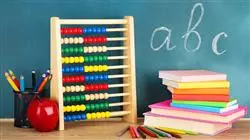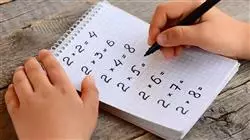University certificate
Accreditation/Membership
The world's largest faculty of education”
Introduction to the Program
Thanks to this 100% online Professional Master's Degree you will get an advanced and agile knowledge about Mathematics Didactics through gamification"

Mathematics is key for human beings to understand their environment and progress within it. In addition, new career opportunities indicate that this subject is of utmost importance to perform jobs in the digital and industrial fields. Technological advances have also reached the classroom, so today's teacher must not only have extensive knowledge of the subject to be taught, but of all the educational tools and techniques available to them.
The inclusion of ICT in schools, even at an early age, goes hand in hand with an increasingly digitalized society. In this scenario, the professional must be able to design and implement traditional and interactive programs that enhance Logical-Mathematical Thinking or facilitate the acquisition of basic concepts of algebra, arithmetic or Mental Arithmetic.
Over 12 months, this Professional Master's Degree provides the most advanced and up-to-date information on Teaching Mathematics in Pre-School and Primary School, with the main objective of ensuring that students obtain the necessary knowledge to advance in educational field. For this purpose, a specialist faculty has prepared a theoretical-practical syllabus which examines the main teaching methodologies and resources that can be used to teach basic and initial mathematical concepts,.
In addition, the Relearning system, based on the repetition of content, will facilitate the acquisition of knowledge in a much more natural and progressive way. Furthermore, thanks to this method, students will reduce the long hours of study that are so common with other methodologies.
This is why teachers have an excellent opportunity to take a flexible university program that is compatible with their professional and work responsibilities. Therefore, to access the syllabus, they only need a computer or tablet from which to connect at any time of the day. With no classroom attendance or fixed class schedules, students also have the freedom to distribute the course load according to their needs. All this makes this program an ideal option for people who wish to obtain a Professional Master's Degree without neglecting other areas of their life.
If you want to grow professionally, this Professional Master's Degree offers you all the educational resources you need for your classes. Enroll now”
This Professional Master's Degree in Teaching Mathematics in Pre-School and Primary School contains the most complete and up-to-date educational program on the market. The most important features include:
- The development of case studies presented by experts in Teaching Mathematics in Pre-School and Primary School
- The graphic, schematic and eminently practical contents with which it is conceived gather scientific and practical information on those disciplines that are indispensable for professional practice
- Practical exercises where self-assessment can be used to improve learning.
- Its special emphasis on innovative methodologies
- Theoretical lessons, questions to the expert, debate forums on controversial topics, and individual reflection assignments
- Content that is accessible from any fixed or portable device with an Internet connection
This is an academic option that will show you the most commonly used board games to work on problems with children in pre-school and primary school"
The program’s teaching staff includes professionals from the field who contribute their work experience to this educational program, as well as renowned specialists from leading societies and prestigious universities.
The multimedia content, developed with the latest educational technology, will provide the professional with situated and contextual learning, i.e., a simulated environment that will provide immersive education programmed to learn in real situations.
This program is designed around Problem-Based Learning, whereby the professional must try to solve the different professional practice situations that arise during the course. For this purpose, students will be assisted by an innovative interactive video system created by renowned and experienced experts.
A university program that will allow you to explore the counting principles of Piaget, Gelman and Gallistel's theory in a more dynamic way"

Gain 24-hour access to the most up-to-date content on Core Standards, EntusiasMat, JUMP Math and ABN methodologies"
Why study at TECH?
TECH is the world’s largest online university. With an impressive catalog of more than 14,000 university programs available in 11 languages, it is positioned as a leader in employability, with a 99% job placement rate. In addition, it relies on an enormous faculty of more than 6,000 professors of the highest international renown.

Study at the world's largest online university and guarantee your professional success. The future starts at TECH”
The world’s best online university according to FORBES
The prestigious Forbes magazine, specialized in business and finance, has highlighted TECH as “the world's best online university” This is what they have recently stated in an article in their digital edition in which they echo the success story of this institution, “thanks to the academic offer it provides, the selection of its teaching staff, and an innovative learning method aimed at educating the professionals of the future”
A revolutionary study method, a cutting-edge faculty and a practical focus: the key to TECH's success.
The most complete study plans on the university scene
TECH offers the most complete study plans on the university scene, with syllabuses that cover fundamental concepts and, at the same time, the main scientific advances in their specific scientific areas. In addition, these programs are continuously being updated to guarantee students the academic vanguard and the most in-demand professional skills. In this way, the university's qualifications provide its graduates with a significant advantage to propel their careers to success.
TECH offers the most comprehensive and intensive study plans on the current university scene.
A world-class teaching staff
TECH's teaching staff is made up of more than 6,000 professors with the highest international recognition. Professors, researchers and top executives of multinational companies, including Isaiah Covington, performance coach of the Boston Celtics; Magda Romanska, principal investigator at Harvard MetaLAB; Ignacio Wistumba, chairman of the department of translational molecular pathology at MD Anderson Cancer Center; and D.W. Pine, creative director of TIME magazine, among others.
Internationally renowned experts, specialized in different branches of Health, Technology, Communication and Business, form part of the TECH faculty.
A unique learning method
TECH is the first university to use Relearning in all its programs. It is the best online learning methodology, accredited with international teaching quality certifications, provided by prestigious educational agencies. In addition, this disruptive educational model is complemented with the “Case Method”, thereby setting up a unique online teaching strategy. Innovative teaching resources are also implemented, including detailed videos, infographics and interactive summaries.
TECH combines Relearning and the Case Method in all its university programs to guarantee excellent theoretical and practical learning, studying whenever and wherever you want.
The world's largest online university
TECH is the world’s largest online university. We are the largest educational institution, with the best and widest online educational catalog, one hundred percent online and covering the vast majority of areas of knowledge. We offer a large selection of our own degrees and accredited online undergraduate and postgraduate degrees. In total, more than 14,000 university degrees, in eleven different languages, make us the largest educational largest in the world.
TECH has the world's most extensive catalog of academic and official programs, available in more than 11 languages.
Google Premier Partner
The American technology giant has awarded TECH the Google Google Premier Partner badge. This award, which is only available to 3% of the world's companies, highlights the efficient, flexible and tailored experience that this university provides to students. The recognition as a Google Premier Partner not only accredits the maximum rigor, performance and investment in TECH's digital infrastructures, but also places this university as one of the world's leading technology companies.
Google has positioned TECH in the top 3% of the world's most important technology companies by awarding it its Google Premier Partner badge.
The official online university of the NBA
TECH is the official online university of the NBA. Thanks to our agreement with the biggest league in basketball, we offer our students exclusive university programs, as well as a wide variety of educational resources focused on the business of the league and other areas of the sports industry. Each program is made up of a uniquely designed syllabus and features exceptional guest hosts: professionals with a distinguished sports background who will offer their expertise on the most relevant topics.
TECH has been selected by the NBA, the world's top basketball league, as its official online university.
The top-rated university by its students
Students have positioned TECH as the world's top-rated university on the main review websites, with a highest rating of 4.9 out of 5, obtained from more than 1,000 reviews. These results consolidate TECH as the benchmark university institution at an international level, reflecting the excellence and positive impact of its educational model.” reflecting the excellence and positive impact of its educational model.”
TECH is the world’s top-rated university by its students.
Leaders in employability
TECH has managed to become the leading university in employability. 99% of its students obtain jobs in the academic field they have studied, within one year of completing any of the university's programs. A similar number achieve immediate career enhancement. All this thanks to a study methodology that bases its effectiveness on the acquisition of practical skills, which are absolutely necessary for professional development.
99% of TECH graduates find a job within a year of completing their studies.
Master's Degree in Teaching Mathematics in Pre-School and Primary School
Can you drink less tea without having drunk any of it? This logic problem engages Alice, the Hatter and the March Hare during one of the iconic scenes in the book "Alice's Adventures in Wonderland". In this literary classic, its author Lewis Carroll, who was a mathematician, introduced curious approaches to the logical-numerical world. Thus, by means of ingenuity, he brought the youngest audience closer to the science of Pythagoras. You too can achieve this with the Master's Degree in Teaching Mathematics in Pre-School and Primary School offered by TECH Global University, a compendium of extremely useful knowledge to incorporate into learning methodologies and give a new approach to fields such as arithmetic, geometry and algebra in light of student interest. Through 100% virtual classes, you will have access to a new categorization in the field of teaching with the highest pedagogical standards. Do you want to make a difference in education? TECH is your best ally to do so.
Innovate teaching mathematics
Ludic has always been one of the most efficient models for cognitive development and assimilation of new concepts. So much so that, a study conducted in 2016 by the Universities of Turin and Liverpool with 931 students in third, fourth and fifth grades of primary school, in 20 different schools, showed that, by teaching chess to children in a particular way, it was possible to improve their math skills. This approach of "playing with numbers" you will be able to approach it within the syllabus that we put at your disposal. There are a total of ten modules which cover in detail from logical-mathematical thinking in early childhood education, to ICT (Information and Communication Technologies) and the development of interactive materials in the classroom. We strive to employ a dynamic and unique digital immersion system so that you can give that vocational impact that the contemporary school world needs so much. Add possibilities, subtract complications, multiply advantages and divide your time to your liking by enrolling with TECH.







